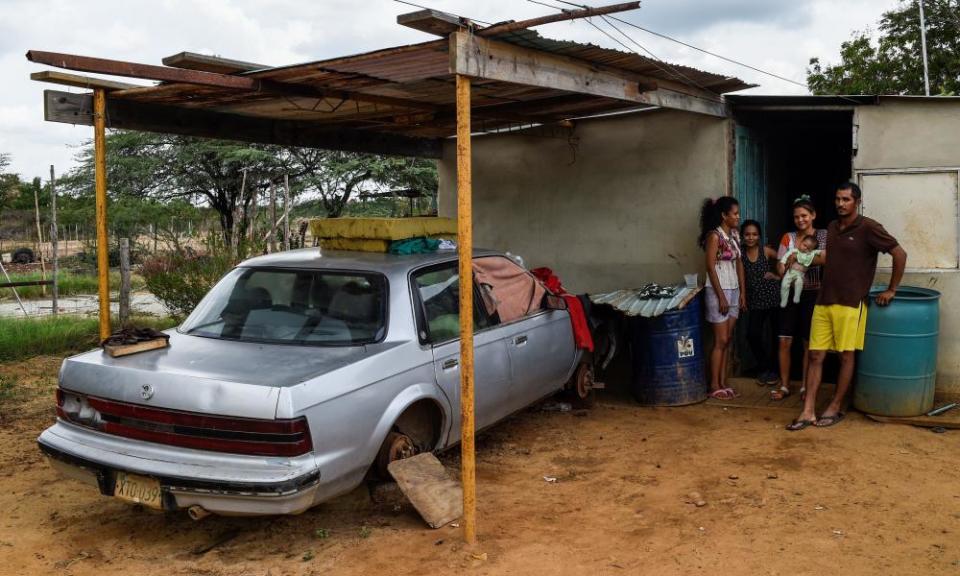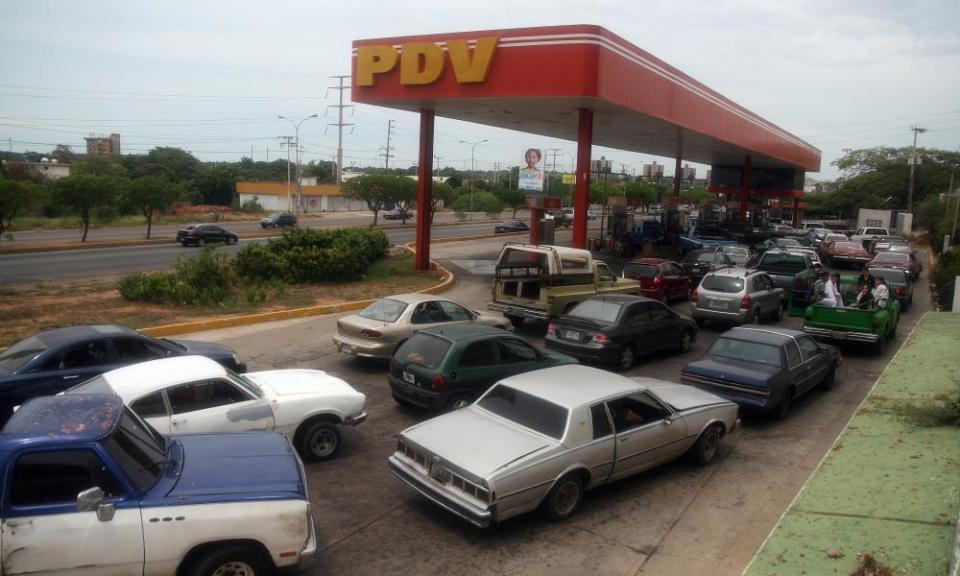Venezuela has dirt-cheap fuel, so why is driving nearly impossible?
Plans for fuel census spark fears of rationing or further government crackdown: ‘They want to have more control over citizens’

In crisis-hit Venezuela, one dollar can buy two Polar beers, a dozen eggs, or a bar of chocolate. Or, taking advantage of the black market exchange rate, it’s enough for 3.5m litres of petrol.
But the 92 tankers needed to carry the fuel would probably be stuck at the pump, broken down and without replacement parts.
Fuel in the oil-rich nation may be practically free, but motorists are finding it increasingly hard to keep their vehicles on the road. Petrol shortages are ever more common: motorists commonly wait for six hours or more in fuel queues.
Batteries, engine oil, and tyres are prohibitively expensive – if they are even available.
And although Venezuela has the largest proven oil reserves on the planet, faltering infrastructure has led to a steep drop in production. The US Energy Information Administration (EIA) predicts that oil production could fall to 1m barrels per day (bpd) this year, and again to 700,000 by December 2019.
Not so long ago, business was booming for Alexis Álvarez, who has been a taxi driver in Caracas for nearly two decades. Nowadays, amid an economic crisis that has pushed ordinary foods out of the reach of many Venezuelans – he is struggling to make ends meet.
“Just changing the engine oil will cost me 120m bolivars,” said Alvarez, adding that he had lost so many clients that his earnings no longer covered routine maintenance of his silver Chevrolet sedan.
The country’s average income is 5m bolivars, which at the official rate is approximately £31 ($41) – though very few people have access to that rate in practice and resort to the black market, where they get about £1.
Now, the government is attempting to alleviate the fuel crisis with a nationwide census of vehicles, and though officials have not been forthcoming with specific details, the president, Nicolás Maduro, has said it will lead to “rational” fuel use.
Alvarez remains unconvinced. “Like all the decisions Maduro has taken since coming to power, the idea of the census is crazy,” he said.
In order to register their vehicles under the new census, which began last Friday, car owners must use a government-issued “fatherland card” to log details and fuel consumption online, before lining up at government offices to complete the process.
Under the late Hugo Chávez, who ushered in Venezuela’s socialist revolution in 1999, a new constitution and numerous elections placed nearly all government institutions under the control of the ruling Socialist party.
This concentration of power was aided by a feuding opposition which carried out ineffectual campaigns and electoral boycotts. After Chávez died of cancer in 2013, he was succeeded by Nicolás Maduro who is even less tolerant of dissent.
Growing political authoritarianism has coincided with greater state dominance over the economy. But expropriations, price controls and mismanagement have led to a 40% contraction of the economy in the past five years.
Oil accounts for 96% of Venezuela’s export income but many foreign companies have been driven out and production has dropped to a 30-year low.
The resulting fiscal crisis has prompted the government to print more money, which has led to hyperinflation and a collapse of the currency.
It also means that the government can’t import enough food and medicine to meet demand.
Maduro has rejected economic reforms out of loyalty to socialism and because many government officials are allegedly getting rich off the economic distortions – through exchange rate scams and by selling scarce food on the black market.
That card, which was introduced late last year, is also used to access government-run food distribution programs and was reportedly required to claim cash rewards for voting for Maduro’s re-election in May. Many Venezuelans have refused to get the card, fearing it is a mechanism for government control.

Maduro, who blames the country’s woes on an “economic war” waged by the US and Europe, has continued to tighten his grip on the power he inherited from Hugo Chávez, Venezuela’s charismatic leader who died of cancer in 2013.
More than 100 people died in angry anti-government protests last year, and Maduro’s May election victory was labelled a sham by the opposition and other countries. Observers fear a further crackdown could be imminent following an alleged attempt to assassinate Maduro with bomb-laden drones on Saturday.
Some opposition lawmakers have said that the vehicle census, announced before Saturday’s problems, could be a precursor to fuel rationing. Others fear the measures are another step towards authoritarianism.
“I think the census is a mockery – a trap with political overtones,” Luis Jaen, a taxi driver in Maracay, a city 76 miles west of Caracas, said. “They want to gather electronic data on every person so they have more control over citizens, and to blackmail those who oppose these measures and the government.”
Lisette Sánchez, a bus owner and driver in Caracas, has not worked for over a month, while her bus sits on threadbare tyres in a carpark. “I have no words to describe how I feel,” she said. “The tyres could blow at any time; it could be dangerous for me and my passengers.”
Meanwhile, the bolivar, Venezuela’s currency, is practically worthless, with the International Monetary Fund (IMF) predicting that inflation will reach one million per cent by the end of the year.
When parts are available, they are prohibitively expensive. “A repaired tyre costs 450 million bolivars ($130 on the black market) while a new one is a billion ($285),” Sánchez said. “A bus needs seven of them – we would need years of work to pay for it.”

Sánchez’s bus is not the only one out of service. Transport union leaders estimate that in just two years the country’s fleet of 280,000 passenger buses has dwindled to 30,000.
Commuters now rely on flatbed trucks fitted with metal railings, popularly known as “dog-carts”. The National Assembly – led by the opposition and sidelined by Maduro last year in favour of a more pliant Constituent Assembly – claims that 55 people have died and 275 been injured while traveling in these vehicles.
Even a rise in oil prices, which are low globally, would not be much help to the embattled country, experts warn.
“Venezuela’s problems are so profound that even the increase in crude prices can’t improve its industry’s situation,” Lejla Villar, an EIA analyst, told a local website in July. “They don’t have trained personnel; they don’t have rigs or parts.”
Those who still own vehicles are struggling to keep them running.
On a recent evening, Norma Gutiérrez, an elderly radiologist, was waiting outside a warehouse in the north of Caracas so that she could buy a replacement car battery.
“I’m not even sure I’ll get one by the time I reach the front of the queue,” she said, after five hours in the line. “If things continue like this, I’ll have to walk everywhere.”

